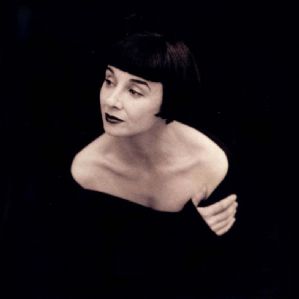<Back to Index>
- Musician and Singer Adriano Maria Correia Gomes de Oliveira, 1942
- Singer Mísia, 1955
PAGE SPONSOR

Adriano Maria Correia Gomes de Oliveira, or just Adriano (April 9, 1942 – October 16, 1982) was a Portuguese musician, born to a conservative Roman Catholic family in Porto. His family moved to Avintes after his birth. He went to Coimbra to study at the University of Coimbra, and eventually dropped out, albeit being involved in the student activism and Coimbra fado music.
Adriano was part of a generation of composers and singers of political songs that used music and lyrics to fight against the Estado Novo dictatorial regime. For that, he became famous among the democratic resistance and was persecuted by the political police, PIDE for his subversive actions. Adriano was a personal friend of many musicians like Zeca Afonso, Padre Fanhais, Sérgio Godinho or Luísa Basto, with whom he collaborated in the recording of many albums.
Adriano was also a member of the Portuguese Communist Party and participated many times in the Avante! Festival. He was also a friend of the socialist Manuel Alegre, who wrote many of his lyrics. He died in Avintes at the age of 40 due to a vascular accident.

Mísia is a Portuguese fado singer, born in 1955 in Porto, Portugal. Mísia is a polyglot. Despite singing mostly fado, she sings some of her themes in Spanish, French, Catalan, English and even Japanese. Mísia depicts herself as a cabaret dancer living in the "Drama Box Hotel" with her musicians.
Mísia's mother was Spanish and used to be a cabaret dancer, which accounts for many of the influences that shaped her music: tango, bolero, the use of Portuguese guitar with accordion, violin and the piano.
Throughout her career, Mísia developed a new style: she modernized Amália Rodrigues's fado, shocking orthodox audiences by adding to the traditional instruments (bass guitar, classical guitar and Portuguese guitar) the sensuality of the accordion and the violin, and borrowing their finest verses from the greatest Portuguese poets.
Her first album was released in 1990, at a time when, even at home in Portugal, fado was a poor career choice for a singer. With the exception of Amalia Rodrigues and Carlos do Carmo, there was no audience for "fadistas". Nevertheless Mísia went on to record an album respecting all the traditional features of the genre, including poems from popular fado songwriters, such as Joaquim Frederico de Brito or José Niza, alongside with poems by famous Portuguese poets, such as José Carlos Ary dos Santos, and even a piece from Vinicius de Moraes´ song, "Samba em Prelúdio".
The album bore her name, "Mísia", and was very well received by both audience and critics outside Portugal, mainly in France. The album was followed by "Fado" in 1993, in which she maintained her decision to use lyrics by popular writers and poets. This time she sang songs by Sérgio Godinho ("Liberdades Poeticas"), Amália Rodrigues ("Lágrima"), along with poems from António Lobo Antunes ("Nasci Para Morrer Contigo"), Rosa Lobato de Faria ("Fado Quimera" and "Velhos Amantes" based on a song by Jacques Brel) and even a text by future Nobel prize winner José Saramago ("Fado Adivinha").
In 1995 she recorded "Tanto Menos Tanto Mais" ("Less Is More"), which combines the texture of classical fado instruments, the Portuguese guitar, the acoustic guitar and the bass, with that of the violin, the accordion, the piano and even the harp. Once more, she sang António Lobo Antunes, but also Fernando Pessoa and João Monge, one of the most appreciated Portuguese lyricists.
The first album to be released in the USA was "Garras dos Sentidos" ("Claws Of The Senses") in 1998. The concept of this album was to use lyrics by famous Portuguese poets with melodies belonging to Traditional Fado (where the melody is not bound to specific lyrics). This way, Mísia not only sang text by past poets like Fernando Pessoa, Mário de Sá Carneiro, Natália Correia or António Botto, but also contemporary poets like José Saramago and Mário Cláudio, and she also invited two writers to write poems for the album, Agustina Bessa - Luís, who wrote the lyrics for the title track, and Lídia Jorge, whose main poem, Fado Do Retorno is sung in two versions: track 4 with piano, accordion, violin and double bass, and track 11 with Portuguese guitar, acoustic guitar, bassa, double bass, violin and accordion.
Her 1999 album, "Paixões Diagonais" ("Diagonal Passions") again used songs from a variety of writers, from João Monge, Amélia Muge, Antonio dos Santos or Vitorino Salomé, to Rosa Lobato de Faria or Sérgio Godinho.
In 2001, she decided to pay a tribute to Amália Rodrigues, after the latter's death, and recorded "Ritual", where all the songs (except the last one) were recorded as traditional three - instrument fados.
Her 2003 album, Canto, may be considered as her masterpiece. Mixing pieces of the best works of the Portuguese guitarist Carlos Paredes with poems by Vasco Graça Moura (and lyrics by Sérgio Godinho and Pedro Tamen), Mísia created a musical work she would describe as belonging to her "gallery of impossible things".
In her 2009 album, Ruas (streets) Mísia goes beyond the boundaries of the fado. The first part of the double album, "Lisboarium" is an imaginary journey through Lisbon, expressed in fado. The second part, "Tourists", however, contains performances by Mísia of very different kinds of music. It includes music in Turkish, Spanish, English and French. The concept is non - fado music that according to Mísia has the "fado soul". An example of this is her version of "Hurt", originally by Nine Inch Nails but inspired by the version by Johnny Cash.